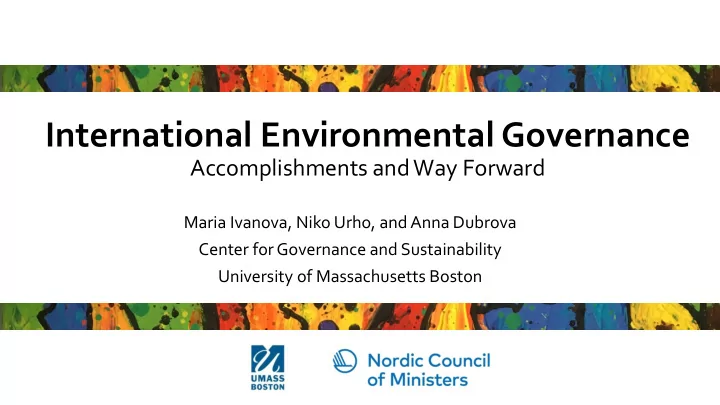

International Environmental Governance Accomplishments and Way Forward Maria Ivanova, Niko Urho, and Anna Dubrova Center for Governance and Sustainability University of Massachusetts Boston
Scope of study • Progress on reform mandates from Rio+20 • UNEP’s governance, funding and functions • Synergies among MEAs • Global Pact for the Environment
Methodology • Interviews • Online survey • Literature review • Expert workshop November 2018 in New York
Governance
UN Environment Assembly Establishment of UNEA • UNEP’s governing council expanded from 58 member states to universal membership • Increased participation, visibility and legitimacy of decision-making but also increased politicization • Preparation, implementation and follow-up of resolutions needs more clarity • Disconnection from science • Link to MEAs vague • Role of ministers in high-level segment needs consideration
Committee of Permanent Representatives 1) Establishment of the OECPR and annual sub-committee meeting of CPR accommodates better non-resident members (60%): • OECPR allows to advance negotiation on resolutions • Annual sub-committee allows focusing on the PoW 2) However, roles of two new CPR bodies still need to be clarified, including timing and resourcing
Funding
Funding trends 2010-2017 • Overall funding has increased 40 % • Earmarked funding has increased (68 % of UNEP funding) • Non-earmarked funding remained at same level but Environment Fund has decreased • Donor base for the Environment Fund is limited - 92 contributors (48% UN member states) in 2017 and 86 (45%) in 2018 • Top 15 donors contribute over 90% of funding to Environment Fund
UNEP’s overall income
Functions
UN system-wide coordination • Mainly through the Environment Management Group: adoption of system-wide Framework of Strategies on the Environment in 2016
Science-policy interface • Vast scientific work and numerous global environmental assessments, however, UNEA is institutionally disconnected from science • GEO • Science-policy business Forum
Environmental information • Investment in communication has increased UNEP’s visibility and outreach • UNEP should continue developing portals like InforMEA and UNEP Live/Environment Situation Room • UNEP should not work on the grassroots level
Regional presence and headquarter functions • 5 sub-regional offices were created after Rio+20 • UNEP’s regional presence is not sufficient to support UN country teams • To consolidate headquarter functions, UNEP relocated senior staff to Nairobi
Capacity building • Capacity building has been incorporated in all subprograms • UNEP needs to strengthen partnerships with other UN field agencies in the context of UNSG reform of the UN development system
Stakeholder engagement • Accreditation increased • Private sector participation increased, but no rules • No stakeholder engagement policy adopted
Number of accredited organizations
Synergies among MEAs
Clustering of MEAs 1) Chemicals & waste cluster • Synergies mainly administrative (BRS conventions), Minamata not integrated • Beyond-2020 process has a potential to improve C&W governance 2) Biodiversity cluster • Are mainly carried out on the country level, through Aichi targets and NBSAPs • No assessment of progress
Way forward
Way forward • Intersessional review process of UNEP’s governance was launched at UNEA4: governing bodies, resolutions, monitoring and reporting (UNEP/EA.4/2, para 10) • Stockholm+50 mandates from the Global Pact and UNEA4 (UNEP/EA.4/2, para 8) • Launch the preparatory process for Stockholm+50
Global Pact for the Environment Forwards these recommendations to the UNEA for its consideration, and to prepare, at its fifth session in February 2021, a political declaration for a UN high level meeting subject to voluntary funding, in the context of the commemoration of the creation of the UNEP by the UN Conference on the Human Environment held in Stockholm from 5-16 June 1972, with a view to strengthening the implementation of international environmental law, and international environmental governance in line with paragraph 88 of the “Future we Want” (Recommendations of the Working Group under Resolution 72/277, para 3b)
Recommend
More recommend